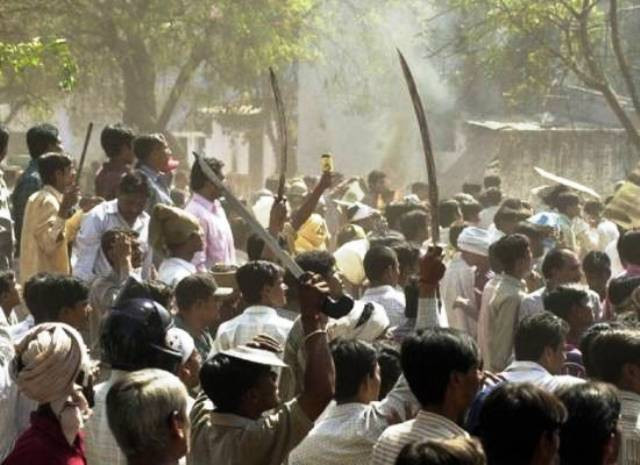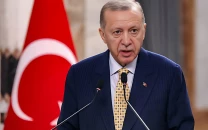Indian Muslims politically irrelevant in Gujarat
Political representation of Muslims weak in western Indian state

Human rights groups say more than 2,000 people, mainly Muslims, were hacked, beaten or burned to death during the riots. PHOTO: AFP/FILE
The only Gujarati Muslim to have been elected twice to India's lower house of parliament, the Lok Sabha, is Ahmedbhai Mohammedbhai Patel, who is of the opinion that it is now almost impossible for a Muslim to get elected to the Lok Sabha from Gujarat.
This is despite 9% of Gujarat's population being Muslim, which would mean that the proportionate number of seats which Muslims should have would be 16- 14 more than the current two elected in the 2012 elections.
Chabahar Port not an alliance against Pakistan: FO
Recent newspaper reports indicate that this may change as there is a 'queue' of Muslims to contest the upcoming elections on a BJP ticket following the success of 350 Muslims in contesting local body polls on behalf of the BJP in 2015. Trends indicate that the party will be disinclined to field Muslims in the next elections as no Muslim ran on a BJP ticket in Gujarat in the last three election.
However, political analysts believe that with elections in Gujarat shifting to caste lines, the BJP may find it beneficial to field one or two Muslims. Examples of constituencies where this strategy might prove fruitful is the Jamalpur-Khadia seat, which has 61 % Muslims and may be contested by long time BJP member Usman Ghanchi.
A local community leader was dismissive of recent support lent to the BJP by Muslims. He said, “in recent months, there are some Muslim voices talking of supporting the BJP, but these are optics. This is a defence mechanism Muslims adopt to make themselves acceptable to the society at large and powers that be. But I don’t think any Muslim votes for the BJP in Gujarat.” He added that the Congress party is following the same strategy in Gujarat.
This has lead to Muslims becoming politically apathetic. Political journalist Rajiv Shah commented on the situation, saying, “I don’t think more than 50% of the Muslim electors cast their franchise.” Social activist Hanif Lakdawala added, “I think no Muslim goes to political parties and no political parties go to Muslims. This is generally true and this time too.”
Mideast, not India, is to blame for Punjab smog
This disconnect of Muslims from mainstream political life can be seen in the ghettoisation of Muslims in Gujarat's most important city, Ahmedabad, where they are kept out of the modern western part of the city. While right wing activists often state that the absence of any large scale violence following the anti-Muslim riots of 2002 is a sign of progress, it isn't seen as such by locals. Shah says, “Things are slightly better now. Middle class Muslims, like their Hindu counterparts, have benefited from economic growth, but the condition of the poor is as pathetic as it was a decade ago.”
Gujarat has historically had very poor representation of Muslims, with even the Congress victory of 1985 only giving Muslims seven seats. Gujarat has had a maximum of two national MPs at one time, with one of them, Ehsan Jafri, himself being a victim of the riots of 2002.
For Muslims in Gujarat to become politically relevant again, a stark departure of historical trends is needed.




1725099588-0/BeFunky-(41)1725099588-0-208x130.webp)














COMMENTS
Comments are moderated and generally will be posted if they are on-topic and not abusive.
For more information, please see our Comments FAQ